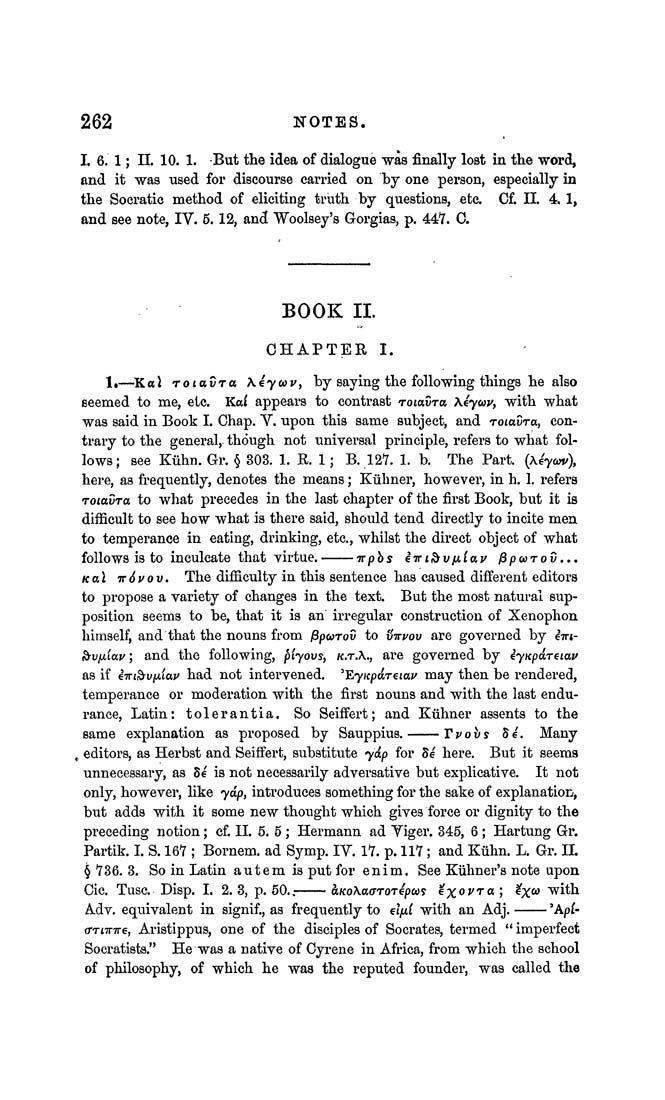262 NOTES.
I, 6. 1; H. 10. 1. But the idea of dialogue was finally lost in the word,
and it was used for discourse carried on by one person, especially in
the Socratic method of eliciting truth by questions, etc. Cf. IL 4. 1,
and see note, IV. 6. 12, and Woolsey's Gorgias, p. 447. C.
BOOKIL
CHAPTER I.
1.—Kai TotaCTa Xeycov, by saying the following things he also
seemed to me, etc. Kai appears to contrast roiadra Xeycav, with what
was said in Book I. Chap. V. upon this same subject, and roiadra, con¬
trary to the general, though not universal principle, refers to what fol¬
lows; see Kiihn. Gr. § 303. 1. R. 1; B. 127. 1. b. The Part. {Xeycov),
here, as frequently, denotes the means; Kiihner, however, in h. 1. refers
TotauTa to what precedes in the last chapter of the first Book, but it is
difficult to see how what is there said, should tend directly to incite men
to temperance in eating, drinking, etc., whilst the direct object of what
follows is to inculcate that virtue.------Trpbs iTTt^vfxlap ^pcorod.,,
Kal tt6pov. The difficulty in this sentence has caused different editors
to propose a variety of changes in the text. But the most natural sup¬
position seems to be, that it is an irregular construction of Xenophon
himself, and that the nouns from ^pcorod to vttpov are governed by eTrt-
^vfxiap; and the following, piyovs, K.r.X., are governed by iyKpdreiap
as if iTTi^vfxiap had not intervened. *EyKpdreiap may then be rendered,
temperance or moderation with the first nouns and with the last endu¬
rance, Latin: tolerantia. So Seiffert; and Kiihner assents to the
same explanation as proposed by Sauppius.------Tpobs Be. Many
, editors, as Herbst and Seiffert, substitute ydp for Se here. But it seems
unnecessary, as Se is not necessarily adversative but explicative. It not
only, however, like 7ap, introduces something for the sake of explanatioD,
but adds with it some new thought which gives force or dignity to the
preceding notion; cf II. 5. 5; Hermann ad Viger. 345, 6; Hartung Gr.
Partik. L S. 167 ; Bornem. ad Symp. IV. 17. p. 117; and Kiihn. L. Gr. IL
§ 736. 3. So in Latin autem is put for enim. See Kiihner's note upon
Cic. Tusc. Disp. I. 2. 3, p. 50..------aKoXaffr or epcos exopra ; ex<y with
Adv. equivalent in signif, as frequently to elfil with an Adj.------'Api-
ffriTTTTe, Aristippus, one of the disciples of Socrates, termed " imperfect
Socratists." He was a native of Cyrene in Africa, from which the school
of philosophy, of which he was the reputed founder, was called the
|








